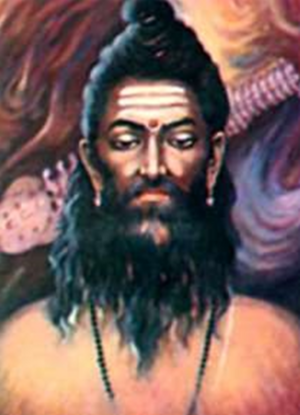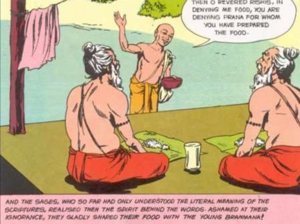Talk:Interiorization of Saguṇa Brahman and all Devatā-s in one’s Body and Soul
By Sri Vishal Agarwal
The different Deva-s are often perceived as limbs of the whole body of One Brahman. Brahman and the Deva-s can be worshipped as external to one’s being, but at the same time, Brahman also abides within as the Antaryāmī. Therefore, the Deva-s too are regarded as residing within the body and ātmā.
One mode of spiritual practice in Hindu dharma involves interiorizing external sacred rites and directing them inward through meditation. The body is envisioned as the universe within which Brahman and all His limbs—the Deva-s—dwell. This approach is illustrated by verses from the Manusmṛti, a foundational code of dharma:
The Ātman alone is the entire multitude of Devas. The universe rests on the Ātman because it alone connects the embodied souls with their karm. Manusmṛti 12.119
Let him therefore meditate upon space as identical with the openings of his body; or upon wind as identical with the organs of motion and touch; on the most exalted light as his eyes and digestive organs; on water as his body fluids; and on the earth as the solid parts of the body. Manusmṛti 12.120
Let him meditate upon the moon as identical with his mind; on the directions as his organ of hearing; on Viṣṇu as his ability to move; on Śiva as his strength; on Agni as identical with his speech; on Mitra as the same as his excretions; and on Prajāpati as one with his procreative organs. Manusmṛti 12.121
Let him seek to know the Supreme Being (Puruṣa) as the sovereign ruler of them all; as smaller than the smallest; as bright as light (or gold); and experienced by intellect (buddhi) only in the state of deep sleep. Manusmṛti 12.122
Some call Him Agni, others Manu, Prajāpati, others Indra, others as prāṇa (life currents), and again others as the eternal Brahman. Manusmṛti 12.123
He pervades all creation comprised of five elements, and makes them revolve like a wheel through the eternal cycle of birth, growth and decay. Manusmṛti 12.124
He who recognizes in this way the Ātman through his own soul and body in all created beings, becomes equal-minded towards all, then enters the highest abode of Brahman. Manusmṛti 12.125
The purpose of perceiving Brahman and the universe within one’s body and soul is not to promote egocentrism, but to cultivate a universal empathy in which the entire creation is seen as one with the Self and with Brahman, thereby deserving reverence and compassion.
In perspectives that emphasize seeking the Divine within, practices such as meditation (dhyāna-yoga) and mental performance of japa or agnihotra are encouraged, while external practices such as mūrti-pūjā, pilgrimages, and temple visits are often downplayed. The nirguṇa-bhakti saints, in particular, stress the Divine’s presence within the heart and sometimes reject external observances.
The nine-petaled lotus (in the heart region), covered over by the three guṇa-s, in which lives the ātman with the Ātman—that indeed the knowers of Brahman know, freed of all desires, serene, immortal, self-existent, contented with the essence, lacking nothing in That. One fears not death who has known that Ātman which is serene, unaging, and ever youthful. Atharvaveda, Śaunaka Saṃhitā 10.8.43–44
The Devas made the human body their mortal home, and dwelt within it. Atharvaveda (Śaunaka) 11.8.18
He should not regard the Devas as residing far away from him. Because to the extent he worships them as being close to him, to that very extent they are really close to him. And he who says, “All these Devas are within me,” then truly in him exist all the Devas. Sāmaveda, Jaiminīya Upaniṣad Brāhmaṇa 1.14.1–2
To search for the Soul, there is no need to go towards east, west, south or north—then what to speak of the intermediate directions. Likewise, He should not be sought anywhere underground or away from the sky either. Mahābhārata 5.43.33
The Royal Sage Janaka said to Sage Śukadeva: The Light of Consciousness exists within us, and not anywhere else. That Light exists uniformly within all living creatures. Anyone can experience that Light within by controlling the mind through meditation. Mahābhārata 12.326.32
Tamas, Rajas and Sattva – regard these as the constituents of the intellect. Due to association with the intellect, the soul too appears to be comprised of these guṇa-s, and conversely the guṇa-s appear to be conscious like the soul. In reality, the soul is a portion of the Supreme Soul. Mahābhārata 12.241.19
The soul is indeed a part of the Supreme Soul, and it resides within the heart of all creatures. But overpowered by Rajas and Tamas, these creatures are not able to see or experience the existence of the soul within themselves. Mahābhārata 12.253.112
The soul, residing within the heart, is like a lamp with infinite rays. Yājñavalkya Smṛti 3.166
Meditate on the Ātman, the Bhagavān, that abides within the heart like a lamp. Agni Purāṇa 165.1
Swami Rāma explains this concept in the following words:
When you go to the source within and see that light in your partner, then you realize, “My partner is not a mere body or an object of sensory gratification, but a human being who has that light of divinity within.” When both partners realize that, then your relationship is a temple. And when you understand that a human being is a shrine, then you don’t need to go to an external temple, church, or chapel to pray. That experience is love: love means knowing the truth within. Then, suddenly, you will discover yourself giving all that you have without any condition – because you have understood the truth. Without love, there is no meaning in anything.[1]
Many religious traditions describe a deity who controls the universe remotely from a place called heaven. Their followers pray by looking upwards, and prophets are described as ascending to meet the deity. Hindu thought recognizes heavens but does not regard them as the sole abode of the Divine, who exists everywhere and within as well. The emphasis is on perceiving the Divine in all places, including within oneself.
Story: Ṛṣi Pippalāda Discovers the Deva-s Within
According to the Skanda Purāṇa, the sage Dadhīci gave up his body so that his bones could be fashioned by Indra into the weapon vajra, used to slay Vṛtra. His son, Pippalāda, grew resentful, believing the Deva-s were selfish in demanding his father’s sacrifice. Feeling deprived, he resolved to punish them.
Pippalāda performed austerities to please Śiva, who appeared before him and granted a boon. He requested that the Deva-s be burned. Despite Śiva urging him to reconsider, Pippalāda persisted. When Śiva finally granted the wish, Pippalāda himself felt burning sensations throughout his body. Alarmed, he asked Śiva why he was suffering instead of the Deva-s.
Śiva replied: “The Deva-s are not merely outside of us. A portion of the Deva-s dwells within every creature. Therefore, if you burn the Deva-s, you too are affected. Your father chose a noble death, sacrificing himself so that all beings may live. Do not diminish his sacrifice by bearing resentment.”
Through this teaching, Pippalāda realized the greatness of his father’s act and abandoned his anger. He later became a renowned sage himself and is traditionally credited as one of the compilers of the Atharvaveda.
Story: How We Treat Others Is How We Treat the Deva-s (from the Chāndogya Upaniṣad)
A young beggar once arrived at an āśrama where two Ṛṣi-s were eating their meal. He said, “I am hungry, could you share your food with me?” The Ṛṣi-s replied, “We do not have enough for you. Please go away.” The beggar then asked, “Which Deva do you worship?”
They answered, “We worship Vāyu, the Deva of air.” The beggar asked, “Before eating, to whom did you offer your food?” The Ṛṣi-s replied, “To Vāyu Deva, of course.”
The beggar responded, “Do you realize that the same Vāyu Deva who flows within your nostrils also flows within every creature? If you deny food to me, you weaken my body and actually deny food to that same Vāyu who is present in both me and you.”
The Ṛṣi-s reflected on his words and realized that to deprive another is to deprive the Divine present equally within all beings. By showing love and compassion toward others, one honors the same Divine. Feeling humbled, they offered food to the beggar, recognizing his wisdom.
A Contemporary Story Narrated by Swami Viditātmananda
A well-known thief from Delhi was once travelling in a train from Madras to Delhi in a first-class compartment. With him was a wealthy passenger rumored to be carrying a large amount of cash.
During the journey, the wealthy man opened his briefcase, took out a wallet filled with currency notes, counted them, and placed it back. He locked the briefcase and slid it under the seat. Later, when the man went to sleep, the thief searched the briefcase thoroughly, but the wallet was missing. The next morning, however, the wealthy man calmly counted the same notes again.
The thief tried again the following night, searching the briefcase, suitcase, pockets, and even clothes, but the wallet remained hidden. In frustration, he gave up. On reaching Delhi, he finally asked, “Where did you hide the wallet? I searched everywhere!”
The wealthy man smiled and replied, “You searched my belongings but overlooked the one place you would never suspect. The wallet was right under your own pillow.”[2]
Moral: The Divine is often missed not because it is absent, but because it is not sought within. Just as the thief overlooked the wallet hidden beneath his own pillow, individuals may fail to perceive the Divine within themselves and others, searching only outwardly.


